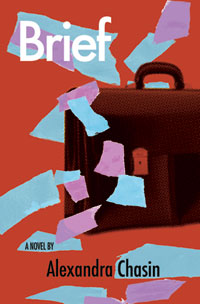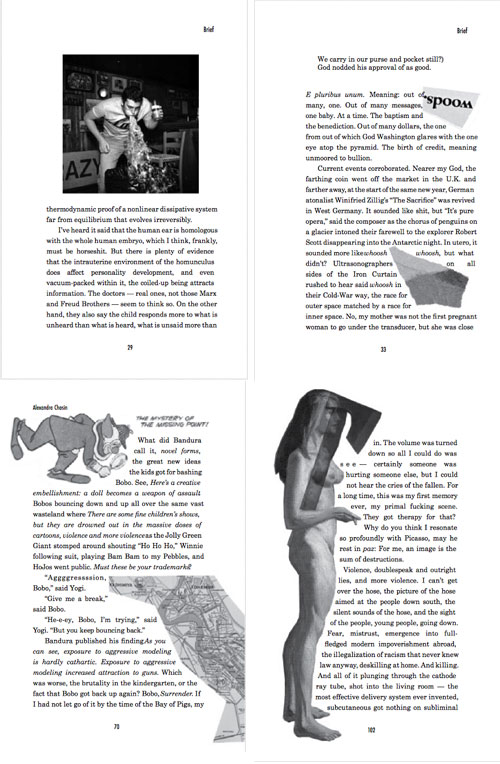 Brief
Brief
by Alexandra Chasin
Jaded Ibis Press, 2012
Paperback: 180 pages / $15 Buy from Jaded Ibis
App Novel / $4.99 Buy from iTunes Store
Just as the pre-digital ancients looked for answers in the stars, coffee grounds, or Sunday astrology columns, today’s mystics look to computer-generated spam, glitch-art, and captchas. With its cold modernist rationalism, literature appears to be a doomed secular medium between these two pseudo-spiritual realms, with books on track to be its tomb.
Neither monkey nor machine, how can The Word survive when challenged by the cybernetic? Alexandra Chasin’s novel/eBook/iPad app Brief is one New Media experiment in literary life-support. Fusing a shizo-analytic modernist screed ala Deleuze and Guattari and Phillip Roth with endless graphic combinations possible via simple computer programming, the work ends-up a high-Modernist mess worthy of gallery exhibition—which might be fine, if such a venue weren’t the protagonist’s target of ire.
In the iPad app version programmed by Scott Peterson, over 34,000,000 images randomly combine and drop into the text. Most of the image-to-text-pairings are misses, doing little to assist the narrative—a 180-page courtroom defense by an art vandal named Inqui (gender indeterminate). Arguing a plea of temporary insanity, Inqui tells the story of their formation from pre-natal to brief stint at art criminal.
It was the Nuclear-Era cultural inundation of violence that drove T.V. Casualty Inqui to scrawl “KILL LIES ALL” on Picasso’s Guernica, an act copy-catting of Tony Shifrazi, who turned the publicity from the act into a career as an art-dealer. The narrative is not so deterministic as to say that an unjust world caused Inqui to commit their crime, but Picasso’s famous authorial deference to the Nazis is implied. Who vandalized Guernica? You did.
Like an infinite game of semiotic Battleship, the arbitrary placement of randomly-generated images has a few inevitable hits, but does little to assist the pros. One hopes for some visual puns to match Inqui’s frequent wordplay, instead the combinations are mostly ugly and uninteresting. An image of Barney Rubble lugging a stone-age television set appears twice, with two separate pictures of nothing generated within the tube. On several other pages, tiny indistinguishable little snippets are dropped-in like Exacto-sliced scrap. On another page an anachronistic frat boy vomits.

Is this a joke on the iPad owner? Maybe for today’s irony-inundated cultural consumer, intentioned art is too heavy-handed? Perhaps this dull app is itself a type of vandalism of the text? If so, not enough—despite having lost control of their agency Inqui firmly controls the text, and their droning is never obscured.
While Inqui’s crime, likely sentence, and personal history present the reader with painfully low impetus to follow the ramble, the most interesting aspect of the essentially guilt-written defense is the momentary argument that the crime was “trying to accelerate the inevitable tendency of the dialectic of art production in the late capitalist context.”
Just as capitalism produces its own gravediggers, art produces its own vandals, and, judging from the case of Chasin’s app/eBook novella, literature is on some similarly suicidal track. But if Inqui were more Situationist than Shifrazi, they would beg for less mercy and more malice. The most exciting parts of Brief are when Inqui shuts up about which T.V. dinner they were served when the Tet Offensive kicked off and instead delves into the mind of fellow art vandals. Homeless Parisian Hugo Unzaga Villegas threw a stone at the Mona Lisa because he was cold and had nowhere to go. Valentine Contrel, an unemployed woman, slashed Ingres’s Sistine Chapel in the Louvre because she preferred prison to work. Freud fired a servant for cleaning the canvas of a painting in his collection with a dirty rag. “Unspoken hostility towards artistic items prevails amongst the servant classes, particularly when the objects, whose value they do not understand, give them extra work to do,” he said.
While the sympathy with art vandals jabs in the right direction, Inqui never really thinks outside the artist box. Inqui, after all, is a product of modern art, randomly generating ugly and insane action, not unlike Peterson’s app. Can we blame the app for being so offensive to our literary sensibilities? After all, the interruption of literature with ironic gimmicks and digitized stunting, like Inqui’s vandalism, is only following in the Western tradition of Colonial violence:
“…the FBI hides the files that reveal the real rebozo, the original vandella, the original J. Wanton, won’t you guess his name. It’s Cortés whose ship I passed like a ship in the night of the centuries later still his pathways etched in the very wavy water and in the junkyard of satellites we used to call the sky when we think about the way we remember him Navy SEALing wax avant la lettre, and see now the way we iterate his non-dit name righ there in court, his name emblazoned on the cortex of the veal farm, the chain-linked stories of the Mexican border, the mall, the overly Euclidean grid of the cities.”
But if Inqui was so angry at the present order of things, why did they limit their ire to the banal gallery situation? Why not a more revolutionary solution? They explain:
“Guns, knives, broken bottles, and refurbished grenades are one thing, but I would not traffic in those found objects, and like it or not, today’s urgent art of the people is writing. All over, again I could, willfully, breathe new life into a painting that screamed for peace while patrons milled about whispering.”
Sure, forms need to explode each other and square minds need to be blown, but today there are too many others doing this much better than Inqui. The Russian art terrorists Voina would have made much more interesting protagonists than the whiny whitebread Inqui. After their New Years Eve 2011 arson of a police vehicle used to transport prisoners, they stated: “Who the fuck needs art when there are trash vampires, trash trucks and werewolves in uniform about? This fire engulfing the trash must be an Eternal Fire… Let’s destroy all prisons!” An offshoot group, Pussy Riot, went on to perform a song called “Death to Prison, Freedom to Protest” on a roof facing Moscow’s largest penitentiary. In the coming months they would become the symbol of the anti-parliamentary anti-Putin movement sweeping Russia.
Yet Voina members are still internationally renowned, curating the Berlin Biennial and even winning a prize from the Russian Minister of Culture. We might likewise imagine Inqui’s defense as a performance art piece to be replicated by admiring professional artists for decades. The Futurist/Dadaist route from riotous to revered seems inescapable.
If there’s a moral in Inqui’s sad sack plea, it might be that if you’ve got to do the time, it might as well be for a crime bigger than attacking paintings. The public immolation of Tunisian Mohamed Bouazizi, the black blocs in Greece and Egypt, the Standing Man of Taksim Square, and the Casserole marches in Quebec are all reminders that human expression doesn’t need to be uploaded, networked, and commoditized. Art is no longer a large enough sanitarium of human expression, and this moment prisons are being built and cops are being trained to contain the overflow. In comparison, the prosecution of lowly art vandals (Vladimir Umanets, Uriel Landeros, Carmen Lucette Tisch) is evidence enough that they need no defense.
While we imagine the Judge sighing and checking his watch during Inqui’s anti-psychoanalytic, anti-Imperialist rant, the reader, already hateful towards the present state of things, judges Inqui as too innocent. Where is the propagandizing, the manifesto, the call for 10 more Inquis, in the model of Poster Boy and Borf? Or how about anything more material than the instantly delete-able eBook? Perhaps refiguring the demand, (or perhaps poking fun at Old Media?) Jaded Ibis offers an $8,500 “fine art limited edition of the novel,” in a box topped by a snow-globe filled with words torn from the book and a miniature easel depicting Warhol’s “Beef Soup.” On second thought, maybe Inqui deserves the chair.
***
A.M. Gittlitz is a freelance writer and bike delivery guy living in Brooklyn. A contributor to The New Inquiry, Vice, Salon, and Shareable his work focuses on radical politics and counterculture. Check him out at gittlitz.wordpress.com.and @dullcommunism on Twitter.
Tags: A.M. Gittlitz, Alexandra Chasin, Brief, Jaded Ibis

[…] Originally published by HTMLGiant: […]